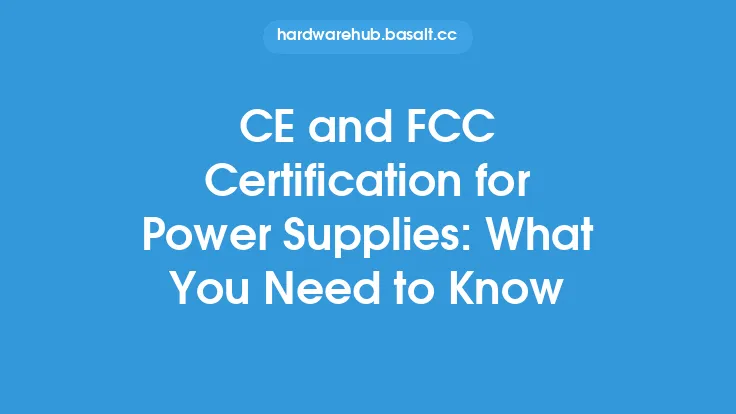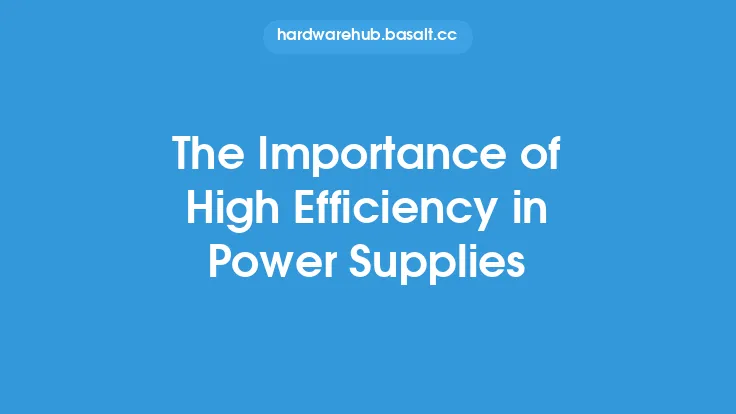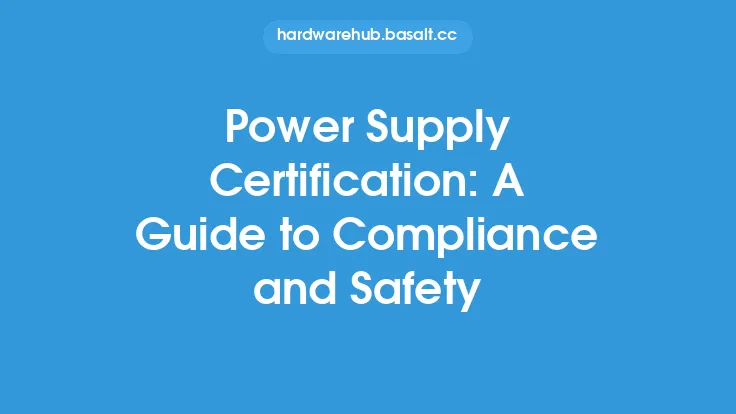When it comes to power supplies, one of the most important factors to consider is efficiency. A power supply's efficiency determines how well it can convert the AC power from the wall outlet to DC power for the computer's components. One way to measure a power supply's efficiency is through the 80 Plus certification program. In this article, we will delve into the details of 80 Plus certification, its different levels, and what it means for power supply performance.
Introduction to 80 Plus Certification
The 80 Plus certification program is a voluntary program that was introduced in 2004 by Ecos Consulting, a company that specializes in energy efficiency. The program is designed to promote energy efficiency in power supplies by providing a standard for measuring efficiency. The certification is based on the power supply's ability to achieve a certain level of efficiency at different loads. The name "80 Plus" refers to the fact that a power supply must achieve at least 80% efficiency at 20%, 50%, and 100% loads in order to qualify for the certification.
How 80 Plus Certification Works
To achieve 80 Plus certification, a power supply must undergo a series of tests to measure its efficiency at different loads. The tests are performed by an independent third-party laboratory, and the results are then reviewed by the 80 Plus organization. The power supply is tested at three different loads: 20%, 50%, and 100% of its maximum capacity. The efficiency of the power supply is then calculated by measuring the amount of power that is actually used by the computer's components compared to the amount of power that is drawn from the wall outlet. The power supply must achieve an efficiency of at least 80% at all three loads in order to qualify for the certification.
Levels of 80 Plus Certification
There are several levels of 80 Plus certification, each with its own set of efficiency requirements. The levels are:
- 80 Plus Bronze: 82% efficiency at 20% load, 85% efficiency at 50% load, and 82% efficiency at 100% load
- 80 Plus Silver: 85% efficiency at 20% load, 88% efficiency at 50% load, and 85% efficiency at 100% load
- 80 Plus Gold: 90% efficiency at 20% load, 92% efficiency at 50% load, and 90% efficiency at 100% load
- 80 Plus Platinum: 92% efficiency at 20% load, 94% efficiency at 50% load, and 92% efficiency at 100% load
- 80 Plus Titanium: 94% efficiency at 20% load, 96% efficiency at 50% load, and 94% efficiency at 100% load
Each level of certification requires a higher level of efficiency, with the Titanium level being the most efficient.
Benefits of 80 Plus Certification
The benefits of 80 Plus certification are numerous. For one, it ensures that the power supply is efficient and will not waste energy. This can lead to cost savings over time, as well as a reduction in the amount of heat generated by the power supply. Additionally, 80 Plus certification can help to reduce the environmental impact of the power supply, as it will use less energy and generate less waste heat. Finally, 80 Plus certification can provide peace of mind for the consumer, as it ensures that the power supply has been tested and certified to meet certain standards of efficiency and performance.
Technical Requirements for 80 Plus Certification
In order to achieve 80 Plus certification, a power supply must meet certain technical requirements. These requirements include:
- The power supply must be able to operate at a voltage range of 100-240VAC, 50-60Hz
- The power supply must be able to provide a continuous output power of at least 65W
- The power supply must have a maximum input current of 12A
- The power supply must have a power factor of at least 0.9
- The power supply must have an efficiency of at least 80% at 20%, 50%, and 100% loads
The power supply must also meet certain safety standards, including UL 60950-1 and EN 60950-1.
Conclusion
In conclusion, 80 Plus certification is an important factor to consider when selecting a power supply. It ensures that the power supply is efficient and will not waste energy, and it provides a standard for measuring efficiency. The different levels of 80 Plus certification provide a way to compare the efficiency of different power supplies, and the technical requirements for certification ensure that the power supply meets certain standards of performance and safety. By choosing a power supply with 80 Plus certification, consumers can be confident that they are getting a high-quality product that will provide reliable and efficient power to their computer's components.





